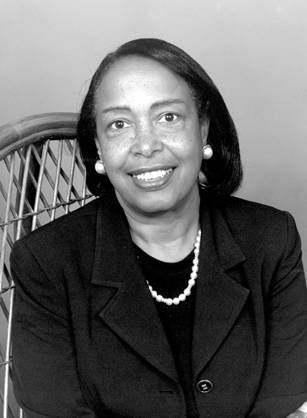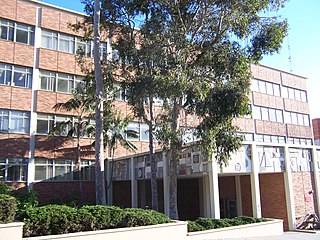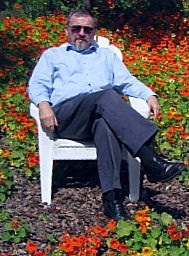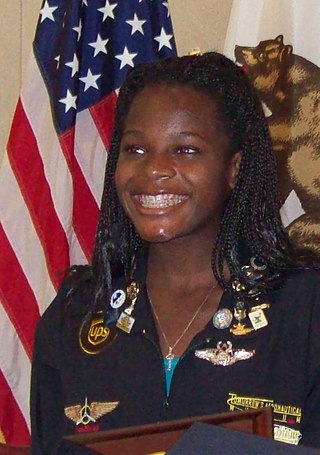
Thurgood Marshall College (Marshall) is one of the seven undergraduate colleges at the University of California, San Diego. The college, named after Thurgood Marshall, the first African-American Supreme Court Justice and lawyer for the landmark 1954 Supreme Court case Brown v. Board of Education, emphasizes "scholarship, social responsibility and the belief that a liberal arts education must include an understanding of [one's] role in society." Marshall College's general education requirements emphasize the culture of community involvement and multiculturalism; accordingly Marshall houses the minors in Public Service and Film Studies for the campus. Significant academic programs and departments have come out of the college over many decades: Communication, Ethnic Studies, Third World Studies, African American Studies, Urban Studies & Planning, and Education Studies.
The American Folklore Society (AFS) is the United States (US)-based professional association for folklorists, with members from the US, Canada, and around the world, which aims to encourage research, aid in disseminating that research, promote the responsible application of that research, publish various forms of publications, advocate for the continued study and teaching of folklore, etc. The Society is based at Indiana University and has an annual meeting every October. The Society's quarterly publication is the Journal of American Folklore. The current president is Marilyn White.
The University of California operates the largest academic library system in the world. It manages more than 40.8 million print volumes in 100 libraries on ten campuses. The purpose of these libraries is to assist research and instruction on the University of California campuses. While each campus library is separate, they share facilities for storage, computerized indexing, digital libraries and management.

Patricia Era Bath was an American ophthalmologist and humanitarian. She became the first female member of the Jules Stein Eye Institute, the first woman to lead a post-graduate training program in ophthalmology, and the first woman elected to the honorary staff of the UCLA Medical Center. Bath was the first African-American to serve as a resident in ophthalmology at New York University. She was also the first African-American woman to serve on staff as a surgeon at the UCLA Medical Center. Bath was the first African-American woman doctor to receive a patent for a medical purpose. A holder of five patents, she founded the non-profit American Institute for the Prevention of Blindness in Washington, D.C.

The UCLA College of Letters and Science is the arts and sciences college of the University of California, Los Angeles (UCLA). It encompasses the Life and Physical Sciences, Humanities, Social Sciences, Honors Program and other programs for both undergraduate and graduate students. It is often called UCLA College or the College, which is not ambiguous because the College is the only educational unit at UCLA to be currently denominated as a "college." All other educational units at UCLA are currently labeled as schools or institutes.

David K. Jordan is a Professor Emeritus at the University of California, San Diego since 2004. He received his Ph.D. from University of Chicago in 1969. Jordan is known for his various service posts to the university. These positions include the chair for the Department of Anthropology, the Director for the Program of Chinese Studies, Provost of Earl Warren College, Interim Provost of Sixth College, as well as one of the Founders of the UCSD Department of Anthropology with psychological anthropologist Melford Spiro. Jordan currently participates in the university Academic Senate committees including the UCSD Graduate Council and the Council of Provosts.
Pravina Shukla is an American folklorist who is Provost Professor of Folklore at Indiana University Bloomington and serves as an adjunct faculty member in the Department of Anthropology, Department of American Studies, the Dhar India Studies Program, and the Center for Latin American and Caribbean Studies. She is also a consulting curator at the Mathers Museum of World Cultures.
The Africana Studies and Research Center (ASRC) at Cornell University is an academic unit devoted to the study of the global migrations and reconstruction of African peoples, as well as patterns of linkages to the African continent. The Africana Studies program offers around 23 graduate and undergraduate courses each semester. Africana offers an undergraduate major for students in the Cornell University College of Arts and Sciences as well as a Ph.D. through the Cornell University Graduate School. The John Henrik Clarke Africana Library, located at the Center, focuses on the social, economic, and political dimensions of the history and cultures of peoples of African descent. It has more than 17,000 volumes.

Kimberly Anyadike is an American pilot from Compton, California. In 2009, at the age of 15, she became the youngest African American woman to complete a transcontinental flight across the United States, from Los Angeles, California to Newport News, Virginia. Anyadike was accompanied by an adult safety pilot, and by a retired Air Force pilot who had served with the WWII Tuskegee Airmen. Her plane was autographed by about 50 Tuskegee airmen as she stopped at different cities across the US, and she completed the round-trip journey in a single-engine Cessna 172 in 13 days.
Kyra E. Hicks is an author, quilter and quilt historian. She writes about African-American quilt history and encouraging quilt documentation. She has created story quilts, such as Black Barbie, which is in the permanent collection of the Fenimore Art Museum in New York City.
Carolyn L. Mazloomi is an American curator, quilter, author, art historian, and aerospace engineer. She is a strong advocate for presenting and documenting African-American-made quilts. Her own quilts are designed to tell complex stories around African-American heritage and contemporary experiences.
Roland L. Freeman was an American photographer and award-winning documenter of Southern folk culture and African-American quilters. He was the president of The Group for Cultural Documentation based in Washington, D.C.

Gladys-Marie Fry was Professor Emerita of Folklore and English at the University of Maryland, College Park, Maryland, and a leading authority on African American textiles. Fry earned her bachelor's and master's degrees from Howard University and her Ph.D. from Indiana University. She is the author of Stitched From the Soul: Slave Quilting in the Ante-Bellum South and Night Riders in Black Folk History. A contributor or author to 8 museum catalogs, Fry is also the author of a number of articles and book chapters. Fry has also served as the curator for 11 museum exhibitions and consultant to exhibits and television programs around the nation.

Kris D. Gutiérrez is an American professor of learning sciences and literacy. She currently holds the Carol Liu Chair in Educational Policy at the University of California, Berkeley and formerly held the Inaugural Provost's Chair at University of Colorado, Boulder. She is professor emerita of the University of California, Los Angeles. She has specialized in "culture and learning in urban schools," according to the Los Angeles Times. She is a member of the National Academy of Education. In April 2020, Gutiérrez was elected as a member of the American Academy of Arts and Sciences.
Chawne Monique Kimber is an African-American mathematician and quilter, known for expressing her political activism in her quilts. She was a professor at Lafayette College, where she headed the department of mathematics. Kimber is now the Dean of the College at Washington and Lee University.
Mensie Lee Pettway is an American artist associated with the Gee's Bend group of quilters.
Alvia J. Wardlaw is an American art scholar, and one of the country's top experts on African-American art. She is Curator and Director of the University Museum at Texas Southern University, an institution central to the development of art by African Americans in Houston. She also is a professor of Art History at Texas Southern University. Wardlaw is a member of the Scholarly Advisory Council of the National Museum of African American History and Culture, and co-founded the National Alliance of African and African American Art Support groups in 1998. Wardlaw was University of Texas at Austin's first African-American PhD in Art History.

Yvonne Wells is an African-American folk artist and quilter from Tuscaloosa, Alabama. She is best known for her self-taught style and her story quilts depicting scenes from the Bible and the Civil Rights Movement. Her work has been exhibited at the Smithsonian National Museum of African American History and Culture and at the International Quilt Museum.
Jean L. Turner is an astrophysicist and distinguished professor in the Department of Physics and Astronomy at the University of California, Los Angeles. She was lead author on research and discovery of a particular star cluster in the dwarf galaxy NGC 5253, considered 'remarkable' for being an extremely dusty gas cloud and having highly efficient star formation.
Carolyn Crump is an American quilting artist whose work focuses on African American culture. Her work is included in the collections of the Smithsonian American Art Museum and the Michigan State University African American Quilt Collection.








